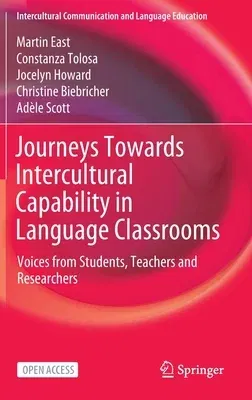Martin East
(Author)Journeys Towards Intercultural Capability in Language Classrooms: Voices from Students, Teachers and Researchers (2022)Hardcover - 2022, 17 May 2022

Qty
1
Turbo
Ships in 2 - 3 days
In Stock
Free Delivery
Cash on Delivery
15 Days
Free Returns
Secure Checkout

Part of Series
Intercultural Communication and Language Education
Print Length
182 pages
Language
English
Publisher
Springer
Date Published
17 May 2022
ISBN-10
9811909903
ISBN-13
9789811909900
Description
Product Details
Book Edition:
2022
Book Format:
Hardcover
Country of Origin:
NL
Date Published:
17 May 2022
Dimensions:
23.39 x
15.6 x
1.27 cm
ISBN-10:
9811909903
ISBN-13:
9789811909900
Language:
English
Location:
Singapore
Pages:
182
Publisher:
Weight:
453.59 gm